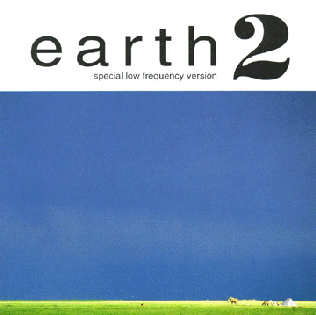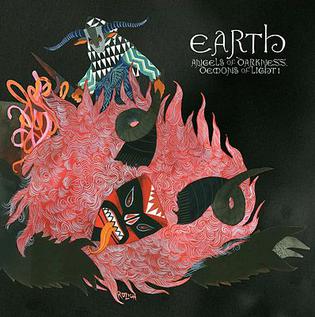
Highway 61 Revisited is the sixth studio album by American singer-songwriter Bob Dylan, released on August 30, 1965, by Columbia Records. Having until then recorded mostly acoustic music, Dylan used rock musicians as his backing band on every track of the album, except for the closing track, the 11-minute ballad "Desolation Row". Critics have focused on the innovative way Dylan combined driving, blues-based music with the subtlety of poetry to create songs that captured the political and cultural chaos of contemporary America. Author Michael Gray has argued that, in an important sense, the 1960s "started" with this album.
Doom metal is an extreme subgenre of heavy metal music that typically uses slower tempos, low-tuned guitars and a much "thicker" or "heavier" sound than other heavy metal genres. Both the music and the lyrics are intended to evoke a sense of despair, dread, and impending doom. The genre is strongly influenced by the early work of Black Sabbath, who formed a prototype for doom metal. During the first half of the 1980s, a number of bands such as Witchfinder General and Pagan Altar from England, American bands Pentagram, Saint Vitus, the Obsessed, Trouble, and Cirith Ungol, and Swedish band Candlemass defined doom metal as a distinct genre. Pentagram, Saint Vitus, Trouble and Candlemass have been referred to as "the Big Four of Doom Metal".

"When the Levee Breaks" is a country blues song written and first recorded by Memphis Minnie and Kansas Joe McCoy in 1929. The lyrics reflect experiences during the upheaval caused by the Great Mississippi Flood of 1927.

"Subterranean Homesick Blues" is a song by Bob Dylan, recorded on January 14, 1965, and released as a single by Columbia Records, catalogue number 43242, on March 8. It was the lead track on the album Bringing It All Back Home, released some two weeks later. It was Dylan's first Top 40 hit in the United States, peaking at number 39 on the Billboard Hot 100. It also entered the Top 10 of the UK Singles Chart. The song has subsequently been reissued on numerous compilations, the first being the 1967 singles compilation Bob Dylan's Greatest Hits. One of Dylan's first electric recordings, "Subterranean Homesick Blues" is also notable for its innovative music video, which first appeared in D. A. Pennebaker's documentary Dont Look Back. An acoustic version of the song, recorded the day before the single, was released on The Bootleg Series Volumes 1–3 1961–1991.
Drone metal or drone doom is a style of heavy metal that melds the slow tempos and heaviness of doom metal with the long-duration tones of drone music. Drone metal is sometimes associated with post-metal or experimental metal.

Earth is an American rock band based in Olympia, Washington and led by the guitarist Dylan Carlson. Initially active between 1989 and 1997, their early work is characterized by distortion, droning, minimalism and lengthy, repetitive song structures; their 1993 debut album Earth 2 is recognized as a pioneering work of the drone metal genre. The band resurfaced in the early 2000s, with their subsequent output reducing the distortion and incorporating elements of country, jazz rock, and folk. Earth's current lineup consists of Carlson and drummer Adrienne Davies.

Dylan Carlson is an American musician, best known as the guitarist and founder of the drone metal/post-rock group Earth, and the main contributor to his solo project Drcarlsonalbion.

Roger "Buzz" Osborne, also known as King Buzzo, is an American guitarist, vocalist and songwriter. He is a founding member of the rock band Melvins, as well as Fantômas and Venomous Concept.

Down in the Groove is the 25th studio album by American singer-songwriter Bob Dylan, released on May 30, 1988 by Columbia Records.

Boris is a Japanese band formed in 1992 in Tokyo and composed of drummer Atsuo, guitarist/bassist Takeshi, and guitarist/keyboardist Wata. All three members contribute vocals. Their work has drawn variously on styles such as sludge rock, drone, metal, noise, psychedelia, and minimalism. Boris has released more than twenty studio albums on various labels around the world, as well as a wide variety of live albums, compilations, EPs, singles, and collaborative albums. They have collaborated with acts such as Sunn O))), Merzbow, Keiji Haino, and guitarist Michio Kurihara.

Earth 2: Special Low Frequency Version, also known as simply Earth 2, is the first full-length studio album by the American drone metal band Earth. Produced by Earth and Stuart Hallerman, it was released on February 5, 1993, on Sub Pop Records. The album was highly influential in the development of the drone music and drone metal genres.
Post-metal is a music genre rooted in heavy metal but exploring approaches beyond metal conventions. It emerged in the 1990s with bands such as Neurosis and Godflesh, who transformed metal texture through experimental composition. In a way similar to the predecessor genres post-rock and post-hardcore, post-metal offsets the darkness and intensity of extreme metal with an emphasis on atmosphere, emotion, and even "revelation", developing an expansive but introspective sound variously imbued with elements of ambient, noise, psychedelic, progressive, and classical music. Songs are typically long, with loose and layered structures that discard the verse–chorus form in favor of crescendos and repeating themes. The sound centres on guitars and drums, while any vocals are usually screamed or growled and resemble an additional instrument.

Hex; Or Printing in the Infernal Method is the fourth full-length studio album by American drone rock band Earth.
Adrienne Davies is the current drummer and percussionist of the drone metal band Earth.

Phase 3: Thrones and Dominions is a studio album by the drone band Earth, released in 1995.
"Mississippi" is a medium-tempo country-rock song by the American singer-songwriter Bob Dylan that appears as the second track on his 2001 album Love and Theft. The song was originally recorded during the Time Out of Mind sessions, but was ultimately left off the album. Dylan rerecorded the song for Love and Theft in May 2001.

Only Life is the third album by the American rock band the Feelies, released in 1988. It was made with the same line-up that appeared on the band's previous album, The Good Earth. The album contains a cover of the Velvet Underground's "What Goes On".

Angels of Darkness, Demons of Light I is the sixth full-length studio album by the band Earth, released on Southern Lord Records. Cello is introduced as a new instrument, along with the usual ones being used since the album Hex. Dylan Carlson describes the album as more melodic and riff oriented. The second part of the album was released in 2012. The album illustrations were created by Stacey Rozich.
"Peace in Mississippi" is an instrumental by Jimi Hendrix. The version included on Voodoo Soup is the original version of the song, as recorded by Hendrix, drummer Mitch Mitchell and bassist Noel Redding in 1968, and different from the version of "Peace in Mississippi" included on Crash Landing, in which Mitchell's and Redding's contributions were supplanted by overdubbed drum and bass parts performed by other musicians in 1975; the version on Crash Landing also includes overdubbed guitar and percussion parts performed in 1975. In addition, the version on Voodoo Soup is about a minute longer than the one on Crash Landing. The version of "Peace in Mississippi" included on the Valleys of Neptune CD single, that was sold exclusively at Walmart, has the unedited version of the song, and so does the B-side of the 2010 release of Hendrix's version of Elmore James's "Bleeding Heart".

Primitive and Deadly is the eighth studio album by American musical group Earth. It was released on September 2, 2014, through Southern Lord Records. The album, which features Mark Lanegan and Rabia Shaheen Qazi of Rose Windows as guest vocalists, is the first Earth album since Pentastar: In the Style of Demons (1996) to feature vocals. Other contributors include Brett Netson of Built to Spill and Jodie Cox of Narrows.














